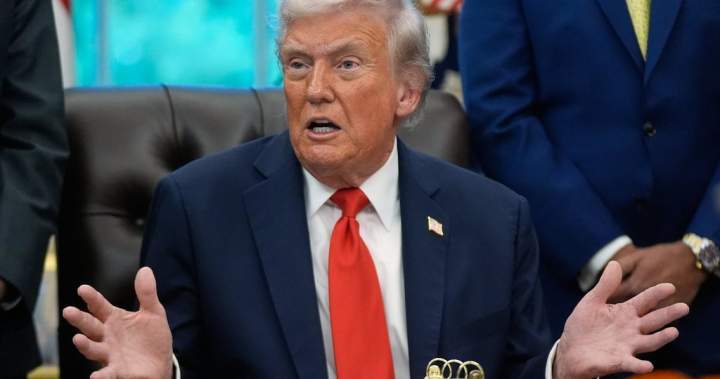U.S. President Donald Trump said Wednesday he wants to attend next month’s Supreme Court hearing on his “vital” tariff policy, calling it “one of the most important cases we’ve ever had.”
The U.S. Supreme Court will hear oral arguments on Nov. 5 on whether the president can unilaterally impose tariffs under emergency powers, bypassing Congress.
The case involves Trump’s tariffs against Canada, Mexico and China over allegations of fentanyl trafficking, as well as his “reciprocal tariffs” on dozens of other countries.
Trump has argued he has the right to use tariffs as a negotiating tool to reach trade deals and, in the case of the fentanyl-related tariffs, force countries to take actions on issues related to U.S. national security.
“Tariffs are vital to this country,” he told reporters in the Oval Office.
“If this country is not allowed to have tariffs, if this country is not allowed to have the president of the United States negotiate on behalf of it with tariffs, we are put in a position where we’re going to be a third-world country. We can’t let that happen.”
Multiple courts have ruled that Trump’s use of the International Emergency Economic Powers Act (IEEPA) to impose tariffs by declaring national emergencies was unlawful and violated the U.S. Constitution, which affords tariffing and tax powers to the U.S. Congress.

Get daily National news
Get the day’s top news, political, economic, and current affairs headlines, delivered to your inbox once a day.
The rulings say the IEEPA makes no specific mention of tariffs as a response to such emergencies, siding with dozens of state attorneys general and small businesses who brought the case.
The tariffs remain in place, however, as the Trump administration appeals the case.

The courts have said Trump has other powers to impose tariffs without Congress, including Section 232 of the U.S. Trade Expansion Act, which has been used to tariff foreign steel, aluminum, autos and other specific sectors.
Trump said Wednesday that the U.S. is bringing in record tariff revenues that are making up for decades of trade unfairness, which he said was why the country’s national debt has exploded to nearly US$38 trillion.
“With tariffs we’re a strong, sound country. We’re a nationally secure, internationally secure country. We’re a very rich country,” he said.
“Without tariffs it’s a slog for this country, big slog … We’re taking in money like we never have before. Without tariffs, that would not be happening.”
The U.S. Justice Department has warned in legal filings in the case that revoking the tariffs could mean “financial ruin” for the United States.
Trump also argued he’s solved global conflicts by threatening steep tariffs on those nations, including India and Pakistan.
“If you want to fight, that’s OK, but you’re going to pay tariffs and they’re going to be very substantial,” he said he told both countries. “Two days later, they call up and they’re not going to fight anymore.”
Trump has not lifted his IEEPA tariffs on Canada despite Ottawa taking several steps to increase border security and crack down on fentanyl trafficking and production.
A presidential memo last month said Canada still needs to do more to address the issue.
Trump has exempted goods compliant with the Canada-U.S.-Mexico Agreement on free trade (CUSMA) from those tariffs, meaning less than 15 per cent of Canadian exports face the 35 per cent duty. Potash and energy exports not compliant with CUSMA face a lower 10 per cent tariff under Trump’s order.
Trade negotiations between Canada and the Trump administration are currently focused on securing sector-specific deals that Ottawa hopes will lower Section 232 tariffs on steel and aluminum, as well as on energy, with future deals on autos and other sectors to come.
Canada-U.S. Trade Minister Dominic LeBlanc told a Senate committee last month that Canada still maintains the position that the fentanyl-related tariffs should be removed.
© 2025 Global News, a division of Corus Entertainment Inc.
Trump says tariffs ‘vital’ as U.S. Supreme Court set to test his authority





